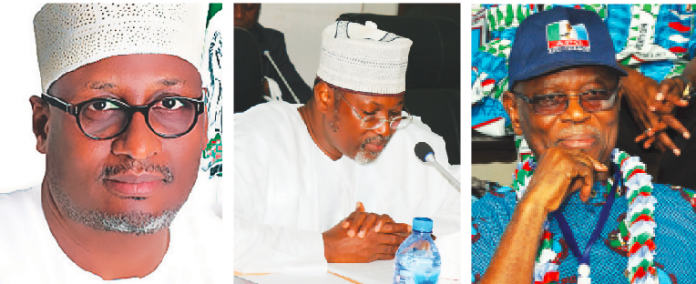Head, News Desk, VICTOR EBIMOMI, examines the controversies trailing INEC’s planned use of card-readers and its implication for the coming election.
The major reason the Independent National Electoral Commission (INEC) offered for introducing the card-reader is checkmating rigging and ensuring credible election.

Card-reader is a device for accessing the data on a memory card such as a compact flash, secure digital or multimedia card (MMC). This unique equipment, according to INEC, will be used most importantly for accreditation, so that every voter’s particulars could be verified and incidence of multiple voting checked.
The commission carried a test-run of the cards on Saturday, March 7, and expressed satisfaction with the outcome.
It said the exercise, which held in 12 states from the six geo-political zones of the country, was successful and will prove useful during the elections. It, however, acknowledged challenges in confirming fingerprints.
But beyond the little shortcoming, INEC has been under serious criticism for planning to use the card-reader. The attack is coming mainly from the Peoples Democratic Party (PDP), which alleges that the failure rate of the computer is high, given that the battery could only last for a few hours and as such may not do a good job.
Its National Publicity Secretary, Olisa Metuh, in a statement penultimate Saturday – the day of the test-run – said the worrisome fallout from the test “vindicates earlier widespread calls by stakeholders that the card-readers should be thoroughly tested to ascertain their workability for credible elections before being deployed for the actual polls.
He maintained that the alleged reported lapses, which he said included but “not limited to non-verification of voters’ fingerprints, even after authenticating their Permanent Voters’ Cards (PVCs), slow accreditation process as a result of poor internet server operations in some locations, and apparent inadequate knowledge of the card-readers by both INEC officials and voters.
“Our response to the emerging problems and challenges from Saturday’s testing of the card-reader is res ipsa loquitor (the fact speaks for itself). The PDP and indeed all well-meaning Nigerians await INEC’s official response and or its final decision after such defining challenges,” he said.
But the opposition All Progressives Congress (APC) did not buy the idea of the PDP.
The Ekiti State APC publicity secretary, Taiwo Olatubosun, said in a statement that though the test-run of the device in the Saturday mock accreditation gave hope of credible polls, there are areas that need to be mended to remove doubts from Nigerians on the credibility and reliability of the device.
According to him, these include reported lapses in the functioning of the machines and inability of the device to recognise the fingerprints of some prospective voters because their fingers were dirty.
He said INEC still has time for more awareness to guide voters to keep their fingers clean to ensure that no Nigerian is disenfranchised, adding that, so far, the exercise demonstrated INEC’s readiness to conduct polls devoid of acrimonious disputes arising from the flawed electoral exercises of the past.
“If the result achieved at the weekend is improved upon, we can safely say that the technology marks the end of over-voting and impersonation problems that dented the credibility of the nation’s electoral process, leading to litigations that tasked contestants’ finances,” Olatubosun said.
Describing the time saved during the exercise as incredible, he said the use of card-reader would eliminate spending long hours on the queue while also removing the fears of health issues that might arise from staying long hours in the scorching sun.
“It is incredible that accreditation for each voter is taking not up to one minute, instead of about five minutes in the past exercises. Apart from eliminating multiple voting, it will encourage voters to vote for candidates of their choice without any fear of manipulation of results.
“We in APC praise this innovation by INEC. From what we have seen in the exercise, INEC has demonstrated that it is ready to create a legacy of credible elections in our country. It is an innovation that Nigerians must encourage INEC to build upon, to have transparent polls to meet international standard of credible poll,” he stated.
He added that it was clear that objections to the use of card-readers were misplaced or out of sheer mischief, saying it was only those who do not want credible poll and who have perfected plans to rig elections that will raise issues against the use of card-readers.
The Saturday test-run, according to INEC, was successful, stressing that it would help to combat electoral fraud. The electoral body said it achieved 100 per cent success in its objective of verifying the authenticity of the PVCs.
On the biometric authentication of voters, INEC conceded that only 59 per cent of voters who turned out for the demonstration had their fingerprints successfully authenticated.
However, the Commission allayed fears of disenfranchisement of voters, saying provision for manual validation had long been put in place for such cases.
“The Commission, in agreement with registered political parties, had provided in the approved guidelines for the conduct of the 2015 elections that where biometric authentication of a legitimate holder of a genuine PVC becomes challenging, there could be physical authentication of the person and completion of an Incident Form, to allow the person to vote,” Chief Press Secretary to INEC Chairman, Kayode Idowu, said in a statement.
The card-readers’ test-run showed the devices could help generate data essential for research and planning purposes, INEC said. “The Smart Card Readers provide disaggregated data of accredited voters in male/female and elderly/youth categories – a disaggregation that is vital for research and planning purposes, but which INEC, until now, had been unable to achieve. The demonstration on Saturday fully served this objective.”
The electoral body said the card-readers were able to send data of all accredited voters from polling units to the Commission’s central server, thereby checking attempts at fraudulent alterations.
Speaking on the controversy generated by the use of the card-reader, the president of Voters’ Awareness Initiative (VAI), Wale Ogunade, came down hard against those opposed to the development, saying they wanted to bring the country back to the old system where rigging was the order of the day.
“It is only a fraudulent person or group that will object to the use of card-reader. No matter how imperfect it is, it is better than going back to the old system of manual voting where people are packed up and rigging is easily done.
“We all know what happened in the years past; even the late President Umaru Yar’Adua attested to it.
“The federal government led by PDP ought to be the front-runner to canvass for its use. Unfortunately, it is even the one kicking against it,” he said.
The constitutional lawyer advised Nigerians to rise up and ensure that rigging in the next election is not allowed, so that the current democracy can be deepened, just as he kicked against the use of military at election, saying it is contrary to Section 217 and 218 of the constitution.













